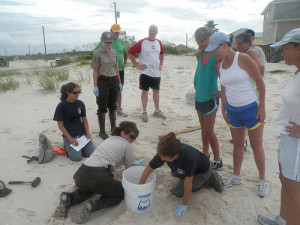
BON SECOUR NATIONAL WILDLIFE REFUGE , Ala. - Relocation procedures for sea turtle that are too close to the tideline. (Photo Credit: U.S. Fish and Wildlife Service photo by Bonnie Strawser)
By Serena Norr and Joann Pan
As we discussed in the first part of this series “The Devastating Impact of the BP Oil Spill on Real Estate,” the oil spill off of the Gulf Coast has not only affected our waters, marshes, animals and our health, but the “worst spill in history” has also greatly impacted the real estate industry. Although we are happy to hear that engineers have been able to stop oil gushing from the well [LA Times Blog], there is the looming question pertaining to the state of real estate in Alabama and Mississippi. Early numbers are estimating that the oil spill will “drive down the Gulf’s property values by 10 percent for at least three years,” according to CoStar Group Inc [Bloomberg]. The International Property Estimate stated that “losses may total $4.3 billion along the 600-mile (966- kilometer) stretch from the Louisiana bayous to Clearwater, Florida.”
Since April 20th, new property developments in Alabama and Mississippi have been put “on hold” and commercial properties such as hotels that are suffering from a decline in tourism and the inability to provide certain supplies such as with restaurants that can no longer offer fresh and local shrimp, oysters, etc. Some of these real estate issues are not immediate, but will impact these areas long after the spill has been cleaned. Will people want to relocate to an area that was once covered in oil — whether directly or nearby? Will the water ever be clean enough for fishing? Will tourism pick up? As the pieces are starting to be picked up and clean-up efforts are prevalent in the Gulf, we will be keeping a watch eye, hopeful that we will be able to report on positive news from the Gulf.
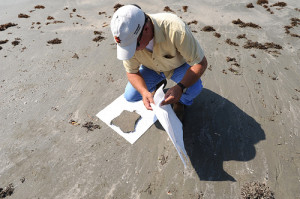
GALVESTON, Tx - Cleaning up tar balls off on Galveston beaches. (Photo Credit: U.S. Coast Guard photo by Petty Officer 2nd Class Prentice Danner)
Alabama’s Businesses Suffer Including Restaurants, Condo Owners, Shops Owners and Fishing Industries
For three months, after the media has continually projected the dismal prospect of coastal communities affected by the BP Oil Spill to the rest of the world, the states lining the Gulf of Mexico are seeing and feeling the onset of low numbers of tourists and homebuyers. When President Obama went to see the effects of the BP oil spill on the state in mid-June, Governor Bob Riley and the communities of Alabama were relieved to have president see the effects for himself. In a speech, the president addressed the jabs that the tourism and fishing industries have suffered. The lives of Alabama’s shop owners, restaurateurs, commercial and sport fishermen and those in real estate have not seen normal business for about three months [Montgomery Advertiser]. As oil continues to wash to shore, it’s not the effects on the beaches that worries community members, but the state’s precious marshes, estuaries and wetlands that will be lost. Tourism is also down, which is evident by the pictures of empty beaches that would normally be flooded with people. There are men bringing booms down to the waters—approximately 10,000 feet of booms a day to keep the oil at bay.
As soon as the oil started leaking—rather gushing relentlessly into the Gulf of Mexico—officials and professionals have been implemented quick clean-up of the space. As personnel continue to tread the waters of the Gulf, people are coming forward with disaster-related illnesses. In Louisiana, their Department of Health is aware of 71 cases and in Alabama, there are 15 reported illnesses—a mix of respiratory problems and skin irritations [CNN Health]. As soon as news like this hits to mainstream, areas where tourism and properties are hot start to see businesses fade.
The NY Times painted a dreary picture for us on July 5 by running a feature about an Alabaman seaside Inn that has seen the scary effects of the oil spill that include a lack of bumper-to-bumper traffic along Perdido Beach, minimal diners at coastal restaurants, missing swimmers in the water and a diminished population of seagulls riding up the coast. And in the place of those summer beach expectations are tar balls and lines of oil that have layered themselves in the daily repetitions of low tide and high tide that brings new sand and oil on shore. The building’s owner is Jerry Gilbreath, 61, who bought the structure in 1980 and turned it into a successful bed-and-breakfast. Now, Gilbreath, like other resort, hotel and property owners in Alabama are struggling to meet ends meet. To give you an idea the inn made $21,000 last June, but only made $6,000 this June, a month after the drum of oil starting leaking [the NY Times].
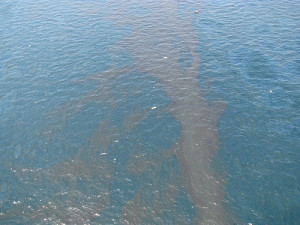
NEW ORLEANS - Debris and oil in the Gulf of Mexico from the Deepwater Horizon drilling.
Mississippi’s Job Loss, Real Estate Outlook and Tourism Industry
Since the oil spill, 4,500 unemployed workers in Alabama, Louisiana, Florida and Mississippi have been hired to clean the beaches– raking and shoveling debris, taking out trash and using power loaders to wash away oil-covered rocks [CNN Money]. Although finding work is always a positive sign (especially since Mississippi has an 11.5 percent unemployment rate), the conditions in which these workers were hired is not something residents of these Gulf States were expecting.
The immediate impact of the spill is not the only matter at hand, but one that Mississippi will be dealing with years after the spill; especially when pertaining to real estate. Recently, several real estate agents and brokers have requested $20 billion dollars as compensation for the loss of sales due to the oil spill. Kenneth Feinberg, a Washington attorney who is working on organizing money for the victims, stated “The Realtors and real estate brokers are a major political force. I’m hearing from them constantly. I’m not sure whether they have a valid legal claim.” As of now, these claims fall into the category of “tough eligibility decisions,” whose issue will be further explored through an independent committee held next month [SunHearald.com].
There is also the issue of the loss of jobs and tourism in Mississippi. A University of Mississippi study found that the oil spill could cost Jackson, Harrison and Hancock counties nearly $120 million in the tourism and service sectors; while the Mississippi Development Authority estimated that tourism was down statewide and about “seven percent in fiscal 2010 to $5.2 billion” [Insurance Journal]. Hit the hardest right now are non-casino hotels, which are down by $50 million and services related to tourism such as restaurants, beverages and food and area beaches (even though no oil has been washed onto Mississippi’s beaches). According to David Bulter, a professor who conducted the survey, these figures are related to the “negative images portrayed by the national news.” There has also been a decline in charter boats and recreational and commercial fishing.
Now that the leaking has been stopped by a temporary cap—until further measures can be made, that is—we wait and hope for positive news in the upcoming months.
Sources and Additional Reading:
All photos are from Deepwater Horizon’s flickr page- http://www.flickr.com/photos/deepwaterhorizonresponse/
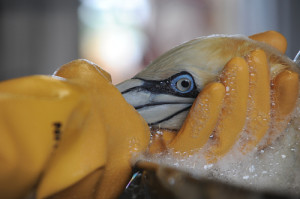
THEODORE, Ala. – An oiled gannet is cleaned at the Theodore Oiled Wildlife Rehabilitation Center. Photo by Petty Officer 3rd Class Colin White.
By Serena Norr and Joann Pan
The numbers are startling: 60,000 plus barrels of oil a day [The NY Times], thousands of fishermen without work [CNN] and an expected 30 percent decline in home values [Housing Watch]. By now, we have all heard about the devastating events that took place on April 20, 2010 – an oil rig exploded off of the Gulf of Mexico spreading crude oil and toxins [including the poisonous Corexit [The NY Times] along the shoreline. Deemed, the “worst oil spill in U.S. history” [National Geographic], the consequences of this unfortunate event have caused an environmental upheaval – affecting our water, marshes, animals and some believe, our health.
Being in the moving industry, we are also greatly concerned with how the spill is affecting the real estate industry – specifically commercial and residential properties, new developments and vacation homes. Some of the affects of the oil spill are already apparent: restaurant owners fear not having fresh fish will put them out of business [McClathchy], hotels are fighting to stay open [The NY Times] and once thriving tourist areas have become ghost towns [CBS News]. A survey conducted by Greater New Orleans, Inc, entitled “Potential Economic Impact of BP Oil Spill” indicated that “50 percent of businesses said they are expected to be hurt by the spill – citing direct interruption of their business due to the spill or false perceptions of the oil spill; while 53 percent of businesses stated they will need outside assistance to regain their losses.” Part of this assistance will come from an independent compensation fund established by the U.S. government — who will toll out $20 billion to compensate those who were greatly affected [CNN]. Although, this is a sizeable amount, there has been no indication as to whether this will cover personal property loss.
Not only an issue for the present, we wonder how the spill will affect the real estate industry in a few years. Will people be excited to build and vacation in the Gulf? Will commercial properties thrive again? Will BP award sufficient money to cover these devastating losses – ranging from fishing, tourism, ecological preservation to real estate? As we follow the headlines, we can only think of the worst in order to prepare best as we learn more about this awful spill in our two-part BP real estate series.
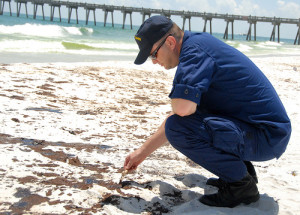
PENSACOLA, Fla. - A Coast Guard inspects oil that has washed onto the beach. Photo by Tech. Sgt. Emily F. Alley.
How the BP Oil Spill is Affecting the Coastal State of Florida
We are quickly approaching the two-month mark of the Transocean Ltd. Deepwater Horizon Oil Spill where (at press time), we learned that BP engineers have been able to stop oil gushing from the well [LA Times Blog]. Although, a welcome relief from the disparaging news we have heard since April; there is still a lot of work to be done. More than 93.5 million to 184.3 million gallons of oil have escaped the bruised well into the Gulf of Mexico [LA Times Blog] making its way down to the coastlines of our southern-most states.
So far, the oil has made its way to the coastlines of our southern-most states — estimated to be 130 miles long and 70 miles wide. Florida’s Governor Charlie Crist has already declared a state of emergency as the oil reaches the Panhandle. The oil slick covers 69 miles of Florida, 328 miles in Louisiana, 108 in Mississippi and 67 in Alabama, according to The Governor of Florida’s Website. Tar balls have been recovered on Pensacola Beach and the Perdido Key.
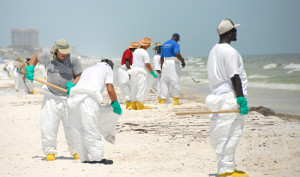
PENSACOLA, Fla. - Workers cleaning oil. Photo by Tech. Sgt. Emily F. Alley.
The BP Oil Spill will definitely bring long-term effects to Florida that at this time unforeseeable. The Palm Beach Post of Florida estimates that Florida will have a loss of 195,000 jobs and nearly $11 billion in revenue losses. These numbers were estimated by a University of Central Florida economist who believes the southern state will suffer from lack of jobs — especially Pensacola fishermen — and from decreased tourism to the nearby Orlando theme parks and the Palm Beach luxury hotels. [The Palm Beach Post] However, the local media outlet does expect reimbursements from BP itself for the canceled reservations over this current summer season, the loss of fishing, clean-up fees, and for other local effects from the nearby explosion of the rig.
The St. Joe Company (NYSE: JOE) is one of the biggest landowners in Florida and has also had one of the toughest times in the midst of the oil spill. With approximately 580,000 acres of land, mostly in Northwest Florida, St. Joe has made a great business based on tourism and owning eight luxury resorts near the Panhandle. According to
realestatechannel.com, St. Joe has refunded money for approximately 151 coastal homes and for a 60-room inn because of the oil. Many local companies are giving out refunds because of people afraid of the effects of the oil spill. St. Joe and other organizations are tackling the BP Oil Spill by asking for reimbursements of business lost and interrupted.
Another case of loss in the situation in Florida is that of Naples beachfront homeowner Cynthia Joannou, who is suing BP for causing environment issues for homeowners who own property along the coast and who will deal with long-term issues, according to m.naplesnews.com. Joannou claims that homebuyers are shying away from moving to Florida strictly because of the cumbersome oil spill. These losses will amount up to $4.3 billion along the entire 600-mile coast line from Louisiana’s bayous to Clearwater, Florida in property estimates, according to Bloomberg. A local realtor in the same article said that this environmental travesty is “the knockout punch the Great Recession didn’t deliver.”
Loss of Jobs, Homes and What is to Come in Louisiana
More than 65 miles of Louisiana’s shoreline—including its beaches and wetlands—are now covered in oil, according to Louisiana’s Governor Bobby Jindal, as stated on The Boston Globe. What once was a vibrant fishing community, thriving vacation spot and an area beginning whose real estate market was revitalizing is once again back in the national spotlight – only five years since Hurricane Katrina.

NEW ORLEANS – Rescue of a loggerhead sea turtle. Photo by Seaman Grace Baldwin.
As a result of the BP Oil Spill, it is expected that Louisiana’s real estate market will drop from five percent to 15 percent in the next 12 months. Home builders – who are still rebuilding – from the devastating effects of Hurricane Katrina have delayed or stalled numerous projects along the Gulf. According to real estate agent Carolyn Angelette, 100 of her clients have canceled their vacation rentals in Grand Isle, Louisiana, as stated on the blog, The Coming Depression. Other reports in Bay County have indicated that housing developments have simply stopped. Tom Ledman, president of the Home Builder’s Association of Panama City-Bay County stated there are no signs as to when construction will start up again [News Herald].
Louisiana’s job market is also estimated to be affected by the oil spill. Based on the “Economic Impact of the Moratorium and Oil Spill” study, it is estimated that 22,000 people will loss their jobs as a result of the oil spill with an overall loss of $8 to $15 million dollars per month – indicated by the surveys worst case scenario model. Jobs such as the fishing industry are also believed to take the biggest hit – bringing $500 million dollars in revenue to Louisiana, followed by processors and then the tourism industry, according to the survey conducted by the Greater New Orleans, Inc. The survey states that encouraging eco tourism, a positive vibe and not selling your home are critical during this disparaging time.
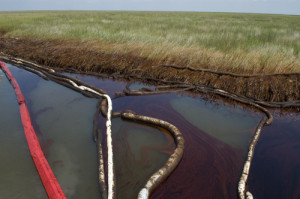
JEFFERSON PARISH, La. Bay Jimmy is one of the more impacted zones remaining in the area. Photo by Petty Officer 3rd Class Zac Crawford.
The issue at hand within the property market has plummeted across the southern coast of the United States. Hotels and home owners are having trouble keeping up with mortgage payments. Many media outlets have reported a total exposure of $136.4 billion to commercial real-estate owners and developers in affected states Alabama, Florida, Louisiana and Mississippi.
Follow us in a few weeks, as we weigh-in on how the oil spill has affected the real estate market in Alabama and Mississippi.
Sources and Additional Reading:
All photos are from Deepwater Horizon’s flickr page- http://www.flickr.com/photos/deepwaterhorizonresponse/